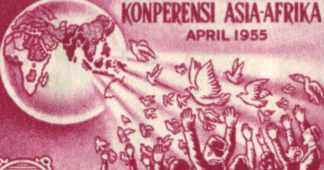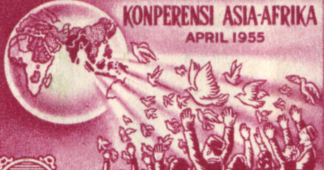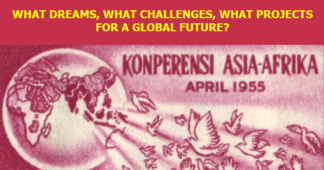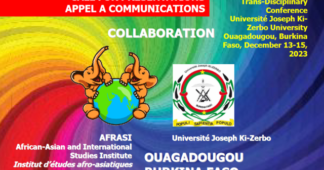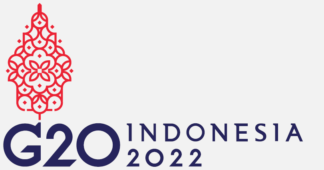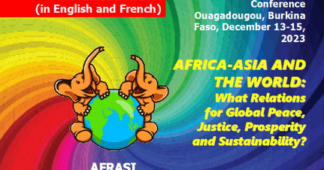INTERNATIONAL AND INTERDISCIPLINARY CONFERENCE
Paris, March 5, 2025
Le Havre, March 6-7, 2025 https://bandungspirit.org/
CALL FOR ABSTRACTS AND FOR PARTICIPATION
The conference is open to individual and group paper presentations. Those willing to present their papers are invited to submit their abstracts until November 30, 2024. The notification of selected abstracts will be communicated to their authors progressively according to their availability from September 2024. The earlier the abstracts are submitted, the sooner the authors will get notified. See the GUIDELINES FOR PRESENTER CANDIDATES below.
“Our task is not to defend this world, but to build the world anew.”
(Sukarno, To Build the World Anew, speech at the UN General Assembly, September 30, 1960, available at https://bandungspirit.org/IMG/pdf/soekarno-to_build_the_world_anew-un-general-assembly- 1960.pdf ).
There is no question that Asia has been rising. The question is, what impact does it have on the world? Or, to be more positive-progressive-prospective, what “desirable impacts” should it have on the world?
One way to answer the question may be to look back at the Bandung Conference, which represented the common and shared dreams of Asian and African peoples, as formulated formally in the Final Communiqué of the Bandung Conference and informally in the expression “Bandung Spirit”. The “Bandung Spirit” itself has never been formulated, and, as a “spirit”, it seems impossible or unnecessary to be. Nevertheless, it may be represented by keywords extracted from the Bandung Principles:
- Peace (peaceful co-existence among diverse political and economic systems, cultures,
religions, human beings, animals, vegetation, and nature).
- Independence (freedom, self-determination, national, people’s and state’s sovereignty liberated from the hegemony of superpowers and of any kind of domination, or invasion, or interference by others).
- Equality (among races, nations, ethnic groups, gender, religions).
- Solidarity (towards the colonised, oppressed, dominated, poor, weak, disadvantaged, especially the victims of injustice, through cooperation among peoples, nations, and states).
- Emancipation (development based on the interests of peoples and sustainable perspective locally and globally).
These ideals are not separated from internationally shared principles. The Bandung Principles were officially linked to the UN Declaration of Human Rights and the UN Charter as their supreme references.
Like a Big Bang generating stars, planets, comets, meteors, etc, the 1955 Bandung Conference generated conferences, cultural festivals, social and solidarity movements, associations/organisations/institutions, research institutes, study centres, academic periodicals, news magazines, etc, making a constellation of alternative movements based on Bandung Spirit up to the present day. Among the most important international institutions generated or inspired by the Bandung Conference are NAM (Non-Aligned Movement), OAU (Organisation of African Unity) then, AU (African Union), UNCTAD (United Nations Conference on Trade and Development), G77, South Centre, ASEAN, TICAD (Tokyo International Conference on African Development), FOCAC (Forum on China–Africa Cooperation) and recently SCO (Shanghai Cooperation Organisation) and BRICS (Brazil, Russia, India, China, South Africa) becoming BRICS+ with more members.
The most outstanding spokesperson for Bandung was President Sukarno of Indonesia. He dedicated the last fifteen years of his life to Bandung Spirit, from its inauguration under his leadership in 1955 until the end of his life in 1970. His speeches consistently reflected the dreams, ideas, vision and spirit of Bandung. One of them is “To Build the World Anew”, pronounced at the UN General Assembly on September 30, 1960, the text adopted by UNESCO in 2023 as Memory of the World.
The speech reflected the international context at that time. It was the era of what Sukarno called “the building of nations and the breaking of empires.” Imperialism was dying but not yet dead, which was very dangerous according to him: “as dangerous as the wounded tiger in a tropical jungle”. Asian countries have re-conquered progressively their political independence from Western control but were still suffering from the impacts of colonialism, WWII and the attempts of Western imperialism to maintain its control over them by provoking or manipulating national instability, proxy wars, separatist rebels, poverty, unemployment, illiteracy, hunger, deceases… African countries started gaining political independence but were still largely under colonial occupation. Reciprocal provocations of the two superpowers heated the Cold War. They were ready to use their nuclear weapons and drag the world into WWIII. The Four Great Powers (USA, USSR, UK and France) were supposed to meet in Paris in May 1960 but failed. In this context, the world’s leaders came together at the UN General Assembly in New York in September 1960. Acting on behalf of the Non-Aligned Nations, the leaders of Ghana (Nkrumah), India (Nehru), Indonesia (Sukarno), United Arab Republic (Nasser) and Yugoslavia (Tito) decided to sponsor a resolution urging the US and the USSR to resume the contacts broken off in May. Sukarno was chosen as a spokesman for this group to deliver their message.
The fundamental message from Sukarno was that “We do not seek to defend the world we know: we seek to build a new, a better world! We seek to build a world sane and secure. We seek to build a world in which all may live in peace. We seek to build a world of justice and prosperity for all men. We seek to build a world in which humanity can achieve its full stature.”
He proposed key issues to be settled, including UN Reform, Colonialism, Imperialism, Decolonisation, War, Peace, Security, and Disarmament… Those issues have not been fully settled to the present day. On UN reform, for example, he stated that the UN is a product of the Western State System.
Let us face the fact that this Organization, in its present methods and by its present form, is a product of the Western State system. Pardon me, but I cannot regard that system with reverence. I cannot even regard it with very much affection, although I do respect it greatly.
Imperialism and colonialism were offspring of that Western State system, and in common with the vast majority of this Organization, I hate imperialism, I detest colonialism, and I fear the consequences of their last bitter struggle for life. Twice within my own lifetime the Western State system has torn itself to shreds, and once almost destroyed the world, in bitter conflict.
Can you wonder that so many of us look at this Organization, which is also a product of the Western State system, with a question in our eyes? Please, do not misunderstand me. We respect and admire that system. We have been inspired by the words of Lincoln and of Lenin, by the deeds of Washington and by the deeds of Garibaldi. Even, perhaps, we look with envy upon some of the physical achievements of the West. But we are determined that our nations, and the world as a whole, shall not be the plaything of one small corner of the world.
Nevertheless, he put great hope to the UN as the supreme international organisation to settle world problems.
In all seriousness I tell you: we of the newly independent nations intend to fight for the United Nations. We intend to struggle for its success and to make it effective. It can be made effective, and it will be made effective, but only in so far as all its Members recognize the inevitabilities of history. It will be effective only in so far as this body follows the course of history and does not attempt to dam or divert or delay that course.
[…]
We are determined that the fate of the world, which is our world, will not be decided above our heads or over our bodies. It will be decided with our participation and co-operation.
In addition, he spoke about the need to turn towards each other between Asia and Africa, which may be seen as the initiation of “South-South Cooperation” and the formation of a “Global South”.
Yes, we have learned much from Europe and America. We have studied your history and the lives of your great men. We have followed your example we have even tried to surpass you. We speak your languages and we read your books. We have been inspired by Lincoln and by Lenin, by
Cromwell, by Garibaldi; and, indeed, we have still much to learn from you in many fields. Today, though, the fields in which we have much to learn from you are those of technique and science, not those of ideas or of action dictated by ideology.
In Asia and Africa today, still living, still thinking, still acting, are those who have led their nations to independence, those who have evolved great liberating economic theories, those who have overthrown tyranny, those who have united their nations, and those who have defeated disruption of their nations.
Thus, and very properly, we of Asia and Africa are turning towards each other for guidance and inspiration, and we are looking inwardly towards the experience and the accumulated wisdom of our own people.
Do you not think that Asia and Africa perhaps – perhaps – have a message and a method for the whole world?
There is a striking resemblance in terms of geopolitical context between the moment of Sukarno’s speech and today. The threat of nuclear war marks both. The principal belligerents are also the same: the West (USA + NATO + Israel) on one side and Russia (successor of USSR) on the other side. However, the constellations around the respective belligerent have changed considerably, especially on the Russian side. While the Western constellation stays the same (USA + NATO + Israel), that of Russia continues to grow with China, Iran and North Korea on stage and BRICS and SCO at the backdrop, not to mention the high number of NAM and African countries in favour of Russia. So, like in the 1960s, an open global war will not likely happen, not because the warrior West loves peace, but because it is not sure that it will win, neither materially nor morally. By a simple calculation, the match will be unequal in terms of material and technology, hardware and software. The military technology and TIC developed by China, Russia, Iran, North Korea and India, for example, will resist if not defeat that of the US, UK, France and other countries of the West. In the field of weapons of mass destruction, the comparative number of nuclear warheads between the nuclear power countries of the West (US, UK, France, Israel) and Russian constellation (China, India, Pakistan, North Korea, Russia) is in favour of the latter: around 6663 against 5849 (2023 Estimated Global Nuclear Inventories, https://www.armscontrol.org/factsheets/Nuclearweaponswhohaswhat checked on 05/07/2023). The imbalance is evident in the number of mobilisable people between the two protagonists. By a simple glance at the demographic statistic (in terms of number and age) between the two belligerents, the number of mobilisable people in China alone will be more than enough to overtake that of the whole West, in addition to BRICS, SCO, NAM, other countries of Africa, Asia and Latin America. Without speaking of the mentality, morality, and spirit of those peoples to be engaged in a patriotic war: ageing, demoralised, spoiled, fragile, fearful of death in the West; young, morally forceful, enthusiastic, energetic, resistant, full of sense of duty, struggle and sacrifice in Russian constellation. As for raw materials needed for war, most of them belong to the countries of the Russian constellation.
In terms of economy, in the 1960s, Asia was the poorest continent in the world, marginal except for its large population. By 2016, its share of world GDP rose from less than one-tenth to three- tenths, while its income per capita surpassed that of developing countries and converged towards the world average income level. Growth in GDP and GDP per capita in Asia was much higher than in the world economy, industrialized countries, and the developing world, Africa and Latin America. Over this period, Asia’s share of world industrial production jumped from a tiny 4 per cent to more than 40 per cent. Its share of world merchandise trade rose from one-twelfth to one-third. Long-term macroeconomic forecasts of GDP at market exchange rates, by the Economist Intelligence Unit, suggest that the top ten economies in the world in 2050, in descending order, would be China, United States, India, Indonesia, Japan, Germany, Brazil, Mexico, Britain, and France (Deepak Nayyar, Resurgent Asia, 2018).
Beyond the economy, Parag Khanna saw Asia becoming more integrated and moving closer towards a “system”. The Asian system does not, and will not, have rules as formalized as those of Europe. There is no supranational Asian parliament, central bank, or military – no “Asian Union”. Instead, the Asian approach to integration involves building complementarities and deferring dangerous issues. Fundamentally, Asians seek not conquest but respect. A sufficient degree of respect for one another’s interests is enough. The Asian system has never been an Asian bloc. On the contrary, for most of history, there has been stability across the many Asian sub-regions and fluidity rather than hierarchy. There will be, therefore, no Chinese unipolarity
– neither globally nor even in Asia. Asians are much more comfortable with the idea of global multipolarity than Americans, for whom recent history (and most scholarship) has focused on unipolar orders – especially their own. However, the more multipolar the world becomes, the more the global future will resemble Asia’s past. Rather than one superpower simply fading away to be replaced by a successor, we are living – for the first time ever – in a genuinely multipolar and multicivilizational order in which North America, Europe, and Asia represent each a significant share of power. Asia is not replacing the US or the West, but it is now shaping them as much as they have shaped it (Parag Khanna, The Future is Asian: Commerce,
Conflict and Culture in the 21st Century, 2019).
So, with the rise of Asia 70 years after Bandung, what are the possibilities to build the world anew? Change the world order? Global rebalancing? Global restructuring? In what way? With industrialisation? Infrastructure? Digitalisation? Development and extension of AI? Renewable energy? Green cities? Sustainable consumption? Global connectivity? Interregional cooperation with AES, ASEAN, AU, BRICS, CEEC, CELAC, EAC, NAM, SAARC, SCO, SADC…? How
about the living conditions of peoples, of grass-root communities, of indigenous, ethnic and religious minorities, especially children and women? How about informalities: informal sectors, informal trade, informal business, informal housing, and informal towns? What role do they play in this global dynamics?
It is to discuss those such questions that the 9th edition of the Rise of Asia Conference Series is organised. It encourages the participation of scholars from a wide range of scientific disciplines (area studies, cultural studies, ecology, economics, geography, built environment, architecture, urban studies, history, humanities, languages, management, political and social sciences, international relations…) and practitioners from diverse professional fields (business, civil society, education, enterprise, government, management, parliament, public policy, social and solidarity movements…) as well as artists and writers, based in diverse geographical areas (Africa, North, Central and South America, Australia, Asia, the Caribbean, Europe, Oceania, Pacific…).
Darwis Khudori, Conference Initiator and Convenor
GUIDELINES FOR PRESENTER CANDIDATES
The selection of presenters is based on the abstract and the basic personal data of the presenter candidates in respect to the following dates:
- Deadline of abstract submission: November 30,
- Notification of selected presenters: progressively starting from September The earlier the abstracts are submitted, the sooner the authors will get notified.
- Deadline of full paper submission for publication project will be decided following the
Abstracts of approximately 200-300 words (excluding figures, tables, and references) and basic personal data of the authors are to be submitted online at: https://forms.gle/zmWFCzk2P1unChV96
FINANCING
The organising committee does not provide a travel grant to any participant even in the case of the physical conference. The presenters and participants are supposed to find the necessary funds for their own participation (visa, international and national transport, accommodation).
We remind our readers that publication of articles on our site does not mean that we agree with what is written. Our policy is to publish anything which we consider of interest, so as to assist our readers in forming their opinions. Sometimes we even publish articles with which we totally disagree, since we believe it is important for our readers to be informed on as wide a spectrum of views as possible.
